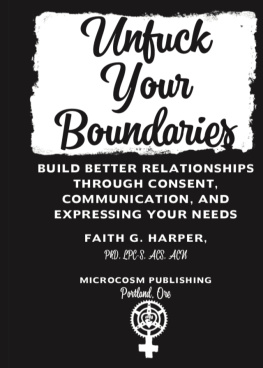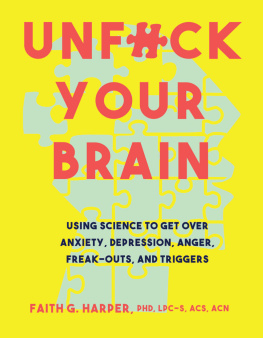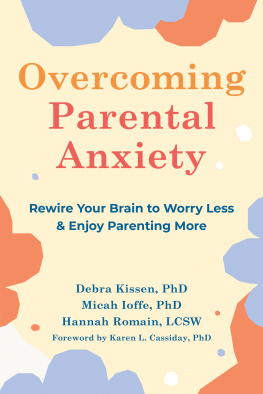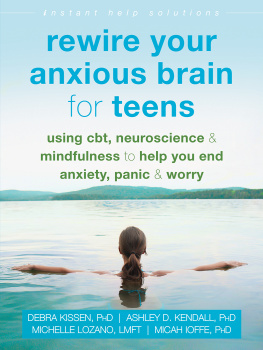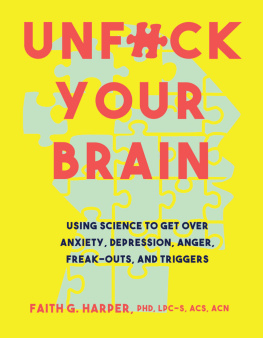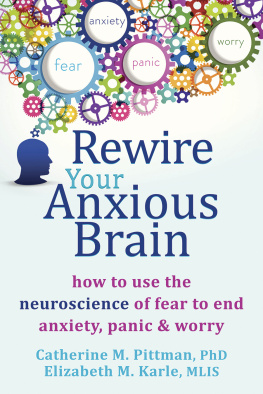Faith G. Harper - Unfuck Your Anxiety: Using Science to Rewire Your Anxious Brain
Here you can read online Faith G. Harper - Unfuck Your Anxiety: Using Science to Rewire Your Anxious Brain full text of the book (entire story) in english for free. Download pdf and epub, get meaning, cover and reviews about this ebook. year: 2021, publisher: Microcosm Publishing, genre: Romance novel. Description of the work, (preface) as well as reviews are available. Best literature library LitArk.com created for fans of good reading and offers a wide selection of genres:
Romance novel
Science fiction
Adventure
Detective
Science
History
Home and family
Prose
Art
Politics
Computer
Non-fiction
Religion
Business
Children
Humor
Choose a favorite category and find really read worthwhile books. Enjoy immersion in the world of imagination, feel the emotions of the characters or learn something new for yourself, make an fascinating discovery.

- Book:Unfuck Your Anxiety: Using Science to Rewire Your Anxious Brain
- Author:
- Publisher:Microcosm Publishing
- Genre:
- Year:2021
- Rating:5 / 5
- Favourites:Add to favourites
- Your mark:
- 100
- 1
- 2
- 3
- 4
- 5
Unfuck Your Anxiety: Using Science to Rewire Your Anxious Brain: summary, description and annotation
We offer to read an annotation, description, summary or preface (depends on what the author of the book "Unfuck Your Anxiety: Using Science to Rewire Your Anxious Brain" wrote himself). If you haven't found the necessary information about the book — write in the comments, we will try to find it.
Unfuck Your Anxiety: Using Science to Rewire Your Anxious Brain — read online for free the complete book (whole text) full work
Below is the text of the book, divided by pages. System saving the place of the last page read, allows you to conveniently read the book "Unfuck Your Anxiety: Using Science to Rewire Your Anxious Brain" online for free, without having to search again every time where you left off. Put a bookmark, and you can go to the page where you finished reading at any time.
Font size:
Interval:
Bookmark:
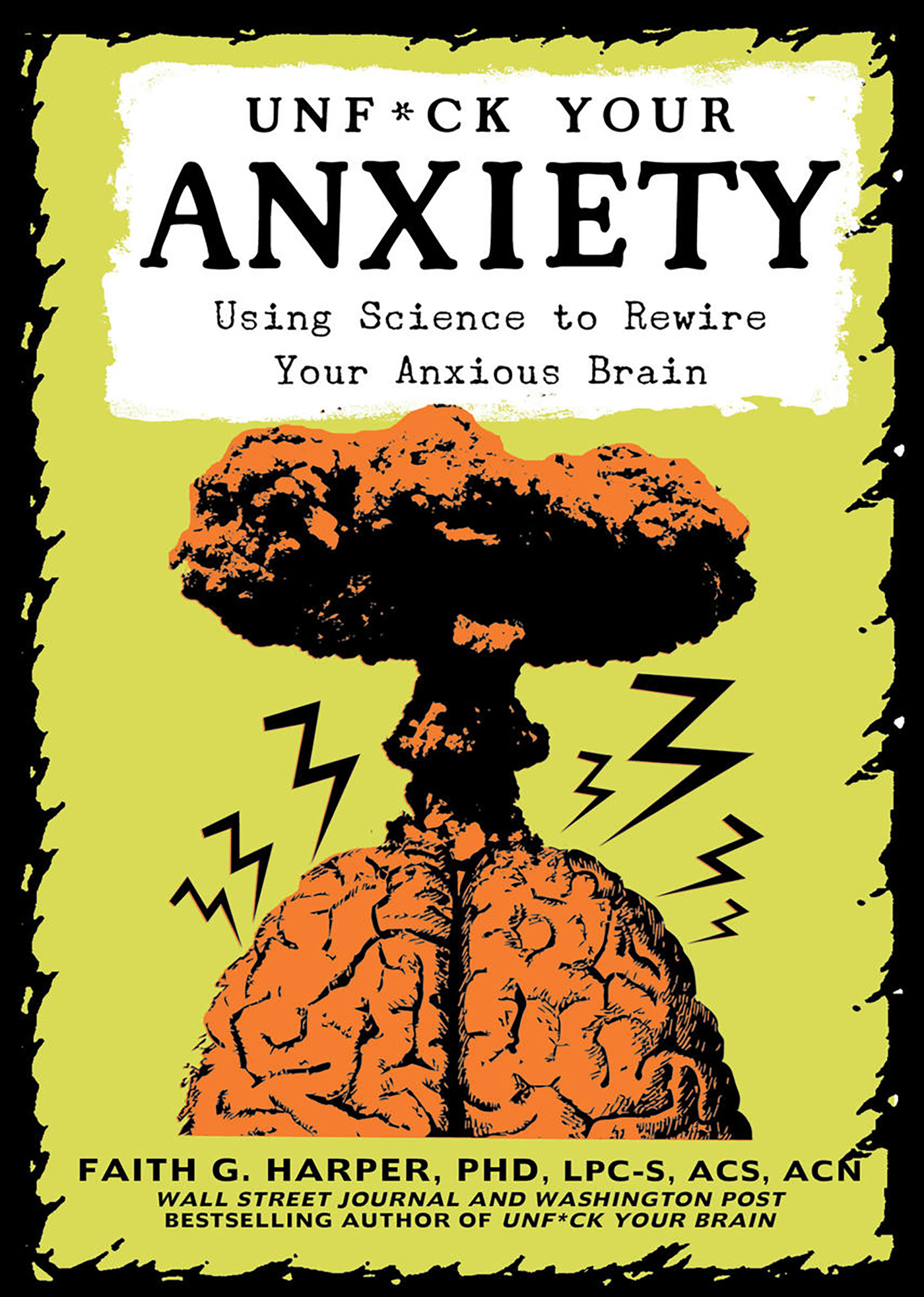
UnF#Ck Your ANXIETY
Using Science to Rewire Your Anxious Brain
Part of the 5 Minute Therapy Series
Dr. Faith Harper, 2016, 2018, 2021
This edition Microcosm Publishing, 2021
First edition, first published 2016
Third edition, first published March 9, 2021
For a catalog, write or visit:
Microcosm Publishing
2752 N Williams Ave.
Portland, OR 97227
www.Microcosm.Pub
eBook ISBN 978-1-62106-673-6
This is Microcosm #205
Edited by Lydia Rogue
Design by Joe Biel

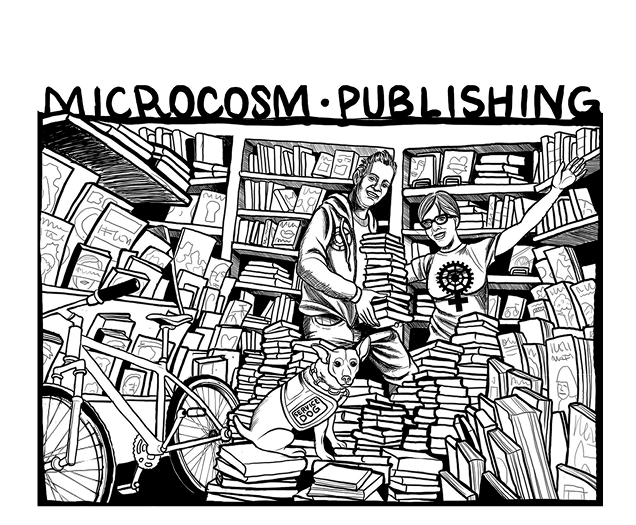
Microcosm Publishing is Portlands most diversified publishing house and distributor with a focus on the colorful, authentic, and empowering. Our books and zines have put your power in your hands since 1996, equipping readers to make positive changes in their lives and in the world around them. Microcosm emphasizes skill-building, showing hidden histories, and fostering creativity through challenging conventional publishing wisdom with books and bookettes about DIY skills, food, bicycling, gender, self-care, and social justice. What was once a distro and record label was started by Joe Biel in his bedroom and has become among the oldest independent publishing houses in Portland, OR. We are a politically moderate, centrist publisher in a world that has inched to the right for the past 80 years.
Did you know that you can buy our books directly from us at sliding scale rates? Support a small, independent publisher and pay less than Amazons price at www.Microcosm.Pub
Contents
New Introduction
Original Introduction
This Is Your Brain on Anxiety
What Is Anxiety?
The Sciency Shit of the Anxiety Response
Stress and Anxiety: Wonder Twins, Activate
Whats the Diagnosis, Doc?
Who Gets an Anxiety Disorder
Does Anxiety Look Different to Different People?
Unfuck Your Anxiety
Learning Your Triggers
Disrupting the Signal: Short-Term Anxiety Management
Lifestyle-Focused Treatment Strategies and Interventions
Medical Model Interventions
Other Complementary Therapies
Finding Treatment Providers
Longer-Term Self-Training
More Shit That Helps
When Someone You Love Has Anxiety
Conclusion
New
IntroDuction
A nyone with anxiety would fail a lie detector test over it.
Stop being anxious has never worked in the history of ever, has it? Someone telling you not to be anxious has never netted the response of Holy shit, I never thought of that! Im totally good now, thanks Big Daddy!
Expecting you to just suppress your anxiety is ridiculous. I mean, you can say youre fine but if you were hooked up to a lie detector your body would be screaming bloody murder that you are clearly as unfine as fuck. Which means if we can see the numbers we need to treat it as the very real health issue/public health crisis that it is.
Which leads me to why this book came to be.
The original version of this book, This Is Your Brain On Anxiety, did better than probably everyone expected it to. Or at least better than I expected it to. I imagine that the inescapable reality of chaos politics, pandemics, and deep state racism helped sales. Unfortunately. But even current reality aside, anxiety is a common and universal human experience with some great books written about it and a ton of really awful ones.
People kept reaching out to me saying Holy shit, I got so much more from this tiny book than all these other door-stop sized books! which is admittedly great for my ego, but a depressing commentary on the utility of what else is out there.
So that got us to thinking... could we bump up our game? Could we expand the anxiety book with just enough stuff to make it more useful without making it a fifty dollar doorstop?
And? Fuck, yeah, we can do that.
So thats what we did here. I included a lot more information about different types of anxiety disorders, more specifics on treatment options, more DIY anxiety management tools, and even more science on brain differences and cultural differences that lend themselves to anxiety. Cuz yall my fellow nerds and I love it.
(Not to mention the fact that there are some amazing books out there on anxiety so I expanded my list of favorites in the appendix. None are 50 dollar doorstops. All are incredibly useful and/or incredible context regarding the human condition.)
Original Introduction
When you struggle with anxiety, the most empowering thing in the world is realizing that you arent weak, broken, or batshit crazy.
Im not just saying that to placate you. Its scientifically true. Anxiety makes perfect sense because its how our brains are wired to protect us. Certain mental health issues, anxiety being one of them, are the direct result of how we have evolved for survival. Certain memories are stored in certain ways in order to protect you. When those memories are triggered, rational thought gets bypassed and your body goes into do something to fix this mode. (If you wanna nerd out more on the brain science stuff, you should totally read my other book, Unfuck Your Brain .)
If youre still reading, that probably means that your brain regularly gets hijacked by anxiety. And youre over that shit. And you want your life back. So heres what were going to talk about:
1) What anxiety actually is. You know, as opposed to all those other emotional states (fear, depression, etc.) that seem all vaguely interconnected but have a lot of differences in terms of whats going on in the brain and how we can best manage them.
2) The whole brain science/brain chemistry aspect of how anxiety is triggered.
3) The how-to-deal-with-it part. Both in the middle of an attack, and more generally over the long term.
4) How to cope when you also have to deal with other people, relationships, jobs, schools, etc. Anxiety wouldnt be so bad if it wasnt for other people in your life, right?
5) How to provide support if someone you care about has anxiety. Because thats just as helpless a feeling as having anxiety yourself.
Has anyone ever told you You should try yoga! Or meditation! Or keep a thought diary! Or spin in a circle three times when a bell rings!
Sometimes (okay, a lot of times) people will suggest something because they read about it, or tried it themselves, or saw other people try it and that it helped. But when youre in the midst of feeling anxious, you look at any option and think, can this actually help my anxiety? And if so, how is it actually helping?
We all get to a point where we are tired of spinning around when the bells ring in hopes of feeling better.
So along with the this is the why shits fucked portion of the book, Ill explain the why part again with the fixing it part. Like this is helpful because it counteracts this chemical in your body with this other one or this is helpful because it helps unpack thinking habits that tend to reinforce anxiety and were gonna try to break that cycle.
Seeking the rationale behind whatever Im doing, or working with clients to do, has made me a better therapist. Its definitely made me a healthier person. We should never swallow everything were told as absolute truth. So, I did my research, figured out why things worked, and figured out ways sometimes to make them work better. Thats how this book came into existence.
Font size:
Interval:
Bookmark:
Similar books «Unfuck Your Anxiety: Using Science to Rewire Your Anxious Brain»
Look at similar books to Unfuck Your Anxiety: Using Science to Rewire Your Anxious Brain. We have selected literature similar in name and meaning in the hope of providing readers with more options to find new, interesting, not yet read works.
Discussion, reviews of the book Unfuck Your Anxiety: Using Science to Rewire Your Anxious Brain and just readers' own opinions. Leave your comments, write what you think about the work, its meaning or the main characters. Specify what exactly you liked and what you didn't like, and why you think so.

